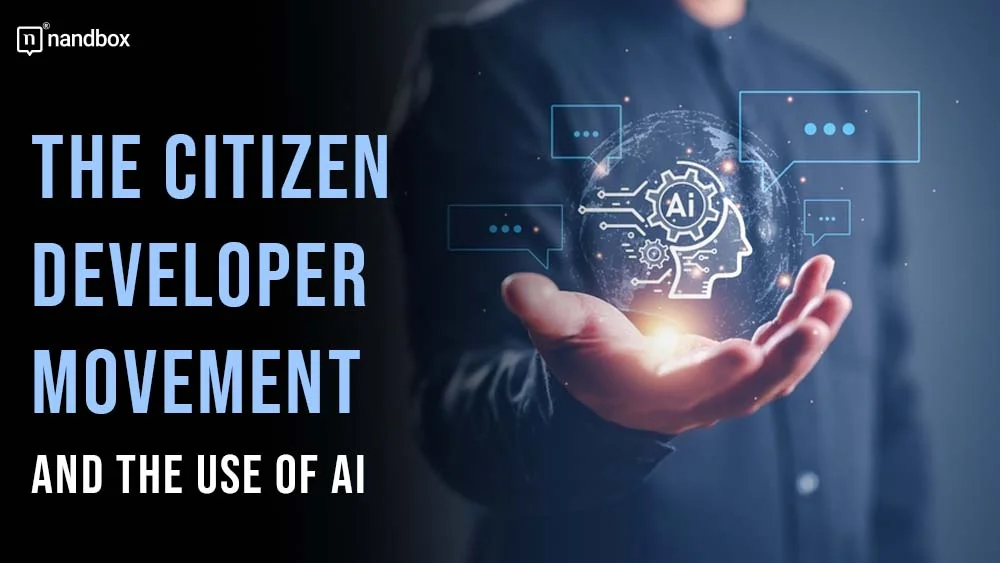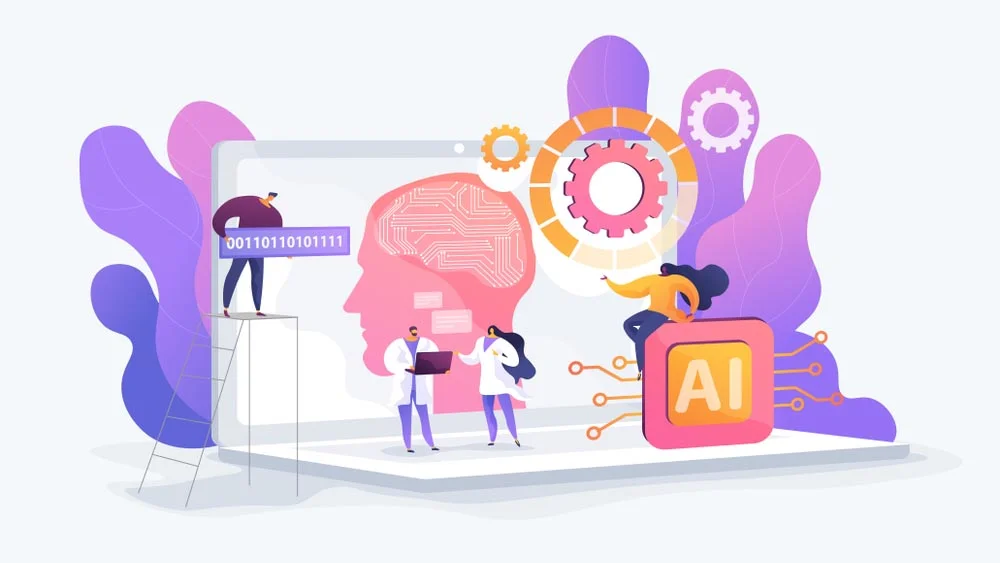The citizen developer movement is going from strength to strength. Businesses all over the world are becoming more and more aware of the need to speed up operations, and as a result, they are seeking Citizen Developers—people who do not have any technical training—to design solutions to specific issues and solve specific concerns. The increasing accessibility of software development is having a profound impact on a wide variety of business sectors. Including marketing, finance, and general administration, it is causing a wave of revolution in a way we never expected.
The progression of artificial intelligence (AI) has further fueled this trend’s acceleration. Tools like ChatGPT, which OpenAI drives, are altering how enterprises carry out their operations by rendering AI more approachable and lowering the threshold for admission. As a growing number of companies rely on AI to drive their digital transformation, developers seem to force these companies to grapple with a shortage of IT professionals and software. Dive into the field of artificial intelligence with the Citizen Developer Movement, a space dedicated to bringing innovation and simplicity together. Let’s go on an adventure together.
The Citizen Developer Movement: AI Tools: Spotlight on ChatGPT!

In addition to the production of code, ChatGPT serves a number of other uses. It has the potential to profoundly impact how businesses approach, among other things, the creation of content, the improvement of their SEO, and the resolution of problems. For example, ChatGPT may generate a broad variety of title suggestions based on an overarching concept, suggest relevant keywords for incorporation, and suggest perfect content structures in the field of content marketing. This technique ensures a more open and efficient process for the development of materials, which in turn produces output of higher quality in a shorter amount of time.
It’s vital to understand that while ChatGPT and other best AI tools are brilliant at organizing and classifying data, these skills fall short of a person’s creativity, decision-making, and intuition. It is challenging yet necessary to switch from AI-generated outcomes to human evaluation and choice-making during the application development process. Citizen developers are key in making the decision on when this shift should occur, ensuring the ideal balance between artificial intelligence efficiency and human intuition.
The need for rapid technological change is much greater than the supply of programmers. The Citizen Developer movement provides a workable solution in this case, made possible by ChatGPT and other AI technologies. Cooperation among citizen developers and AI can close this demand-supply gap, assisting businesses in staying on the cutting edge of technology. In this day and age of AI-driven development, businesses that are ready to adapt and apply this potent combination will find themselves in an intriguing new environment. Outstanding operational effectiveness and cutting-edge innovation are the results.
The Citizen Developer Movement: No-Code Development Infused With AI
The introduction of no-code development has simplified the process of application creation by making it possible for people who are not proficient in coding to participate in technological developments. When combined with AI, this opens up a whole new realm of potential applications. Thanks to AI chatbots, users can experience a seamless interface that comprehends and responds to their needs. Natural language processing (NLP) and conversational artificial intelligence are what power these chatbots.
Putting Artificial Intelligence in the Hands of Citizen Developers
Due to the recent release of tools like ChurchAPT, the number of AI-capable technologies that are now easily accessible to citizen developers is drastically growing. For citizen developers, this offers a world of options to employ AI in many applications.
Thanks to AI tools, no-code is now substantially more approachable. For instance, you can snap a picture of a form you wish to automate using a feature called Snap-to-App, and the tool will then create a digital copy of that form on the canvas of your choice with all the required validations. The development process is accelerated significantly as a result—often by at least 10 to 20 percent.
Another way AI might help automate the administration of huge quantities of data that enter the hands of a company is through IDP. Instead of manually entering data from these documents into a no-code application, you may provide an image of the document, and AI will automatically extract the relevant information.
As with any quickly embraced technology, quality control, diligence, and accountability are stressed more. For reliable results, it is crucial to use high-quality data and models. It is crucial to make sure the models have been created with enough data and are not overly biased.
One application that has attracted a lot of interest is the use of technologies like ChatGPT or OpenAI to speed up integration development. They are essential for bridging the divide between platforms for creating low- and no-code applications and more complex internal systems in a company. These interconnection platforms are getting more user-friendly with drag-and-drop functionality.
The Citizen Developer Movement: The Benefits Citizen Developers Receive From Harnessing the Power of AI
There are many benefits to be listed here. It is important to understand what you will be providing when citizen developers are empowered with AI tools. Here are some of the benefits they may like leveraging to their side:
- Unleashes creativity: By automating hard activities, AI improves citizen developers’ talents so they may concentrate on the innovative aspects of program creation.
- Higher rates of efficiency and speed: AI-powered tools can shorten the development cycle, reducing the time required to create and launch apps.
- Solutions focused on users: Citizen developers may better cater their programs to the demands of their users, creating more individualized and interesting experiences.
- Data-driven decisions: AI helps citizen engineers along the development process by providing actionable insights from data.
- Automation and integration: Artificial intelligence can automate mundane operations and integrate a wide variety of computer systems, both of which simplify development and improve functionality.
- Saves a lot of developmental costs: AI helps to streamline development workflows, which ultimately results in more cost-effective solutions and more efficient use of resources.
- Enhanced Scalability: Applications that are empowered with AI are built to handle higher loads, which ensures that solutions can develop alongside the demands placed on them by users.
- A much more personalized user experience: Applications that are industry-specific, such as those used in the healthcare or e-commerce sectors, can measure user emotions through sentiment analysis and alter answers and interactions for more individualized experiences.
- AI’s predictive capabilities: Enable citizen developers to anticipate and proactively meet future requirements by analyzing patterns and trends.
A Citizen Developer’s View of AI’s Ethical Concerns
There are a number of ethical concerns that arise as a result of the proliferation of AI skills and technology, particularly those that are connected to issues of bias and privacy. These difficulties, in particular in the scenario of citizen developers, demand full oversight and mitigation from both a practical and policy standpoint.
AI and Rising Privacy Concerns
In a world where data is gaining an ever-increasing amount of significance, systems that use AI may access an incredible amount of it. When AI systems are responsible for handling sensitive data, this creates significant privacy concerns. In order to comply with the General Data Protection Regulation (GDPR) and other local legislation, corporations and citizen developers have the responsibility to ensure that they adhere to stringent data protection and privacy criteria. When stakeholders meet this condition, only then will they, as well as users, be able to maintain their mutual confidence.
Overcoming AI’s Biases
AI currently has a significant additional problem with bias. If you use biased algorithms or datasets, you can introduce bias into AI systems without meaning to. This can cause them to produce unfair results. When utilizing AI technologies such as ChatGPT, it is the responsibility of citizen developers to ensure that the data they provide for training these tools is varied and representative, while also minimizing any biases that may be present.
AI Ethics Frameworks: A New Development
In response to these issues, the development and application of ethical AI frameworks have accelerated. These frameworks provide suggestions for developing and utilizing AI while respecting core values and concepts. These frameworks give citizen developers a map for navigating AI’s ethical landscape, enabling them to create not only inventive apps but also moral ones.
AI’s Democratization: Opportunities and Duties
The democratization of AI is a double-edged sword that both emphasizes the need for care and close focus on ethical issues and expands the range of options available to citizen developers. We must actively address quality assurance, bias analysis, and safeguarding privacy during development.
The Citizen Developer Movement: Getting Past Obstacles and Looking Forward
Still, after their development, there are issues that we should focus on solving. That is despite the enormous potential of no-code platforms and AI. Critical components include model development and performance optimization, which guarantee that chatbots powered by AI provide precise and effective responses. However, as AI develops more, a bright future seems to be ahead. Even more potent tools and capabilities will be made available to the Citizen Developer movement, which is being propelled by No-Code and AI, spurring innovation in industries like banking, finance, and customer support.
Wrapping It Up!
In the era of developing AI, the demand for ethical artificial intelligence frameworks is more crucial than ever. These frameworks are crucial for educating citizen developers on effective and ethical AI use. How well AI balances creativity and ethical issues will determine if it improves lives in the future. That is while protecting privacy, promoting fairness, and being inventive while also taking legal concerns into account.
If you would like to explore more options for grading AI and no-code solutions, check out our no-code app builder, which will help you create a seamless no-code native app. Apps are now the language everyone is speaking in this technological era. That is why it is one of the leading tools that will help empower your business efficiently. Sign up now and take your success to a whole new level.





